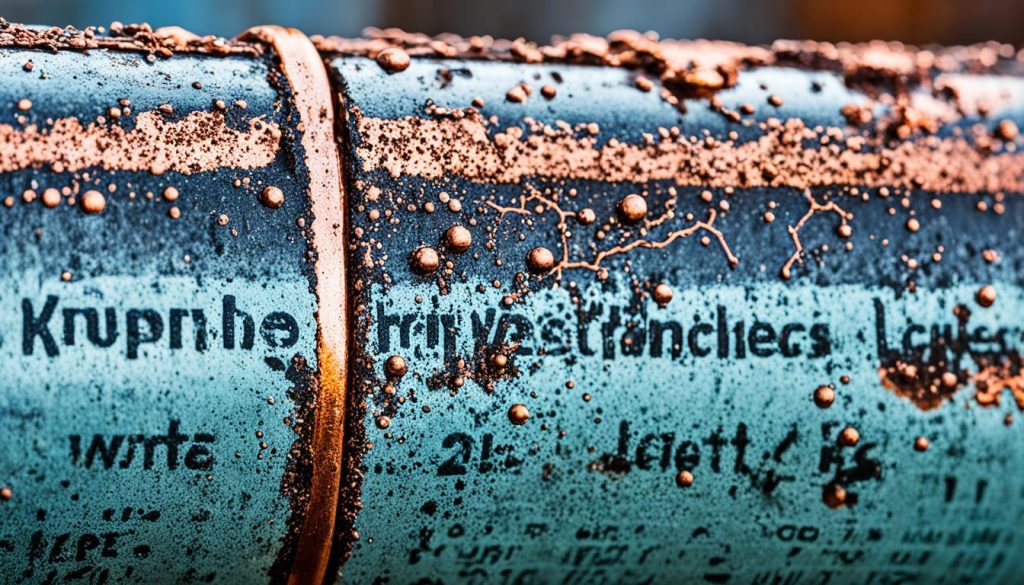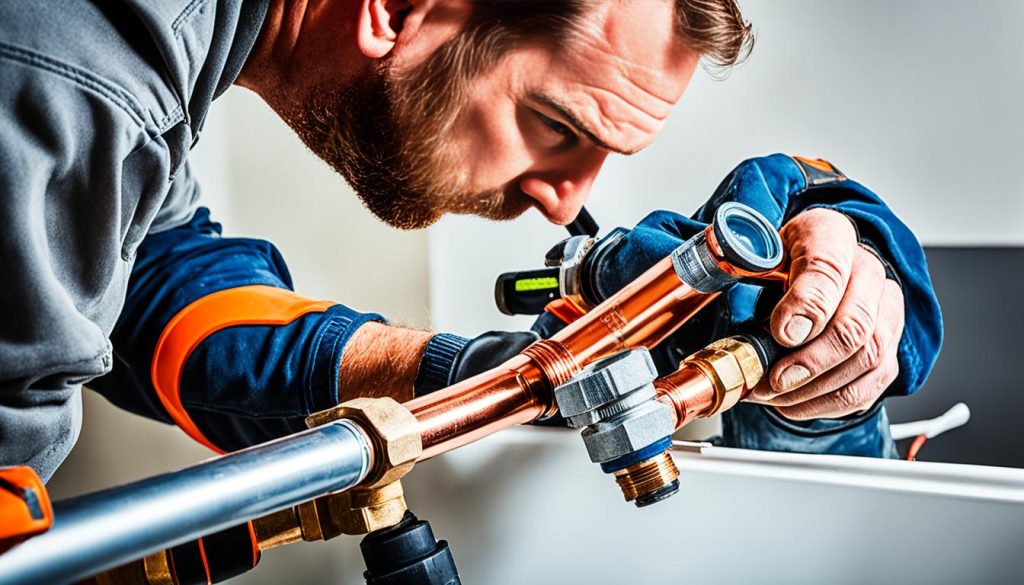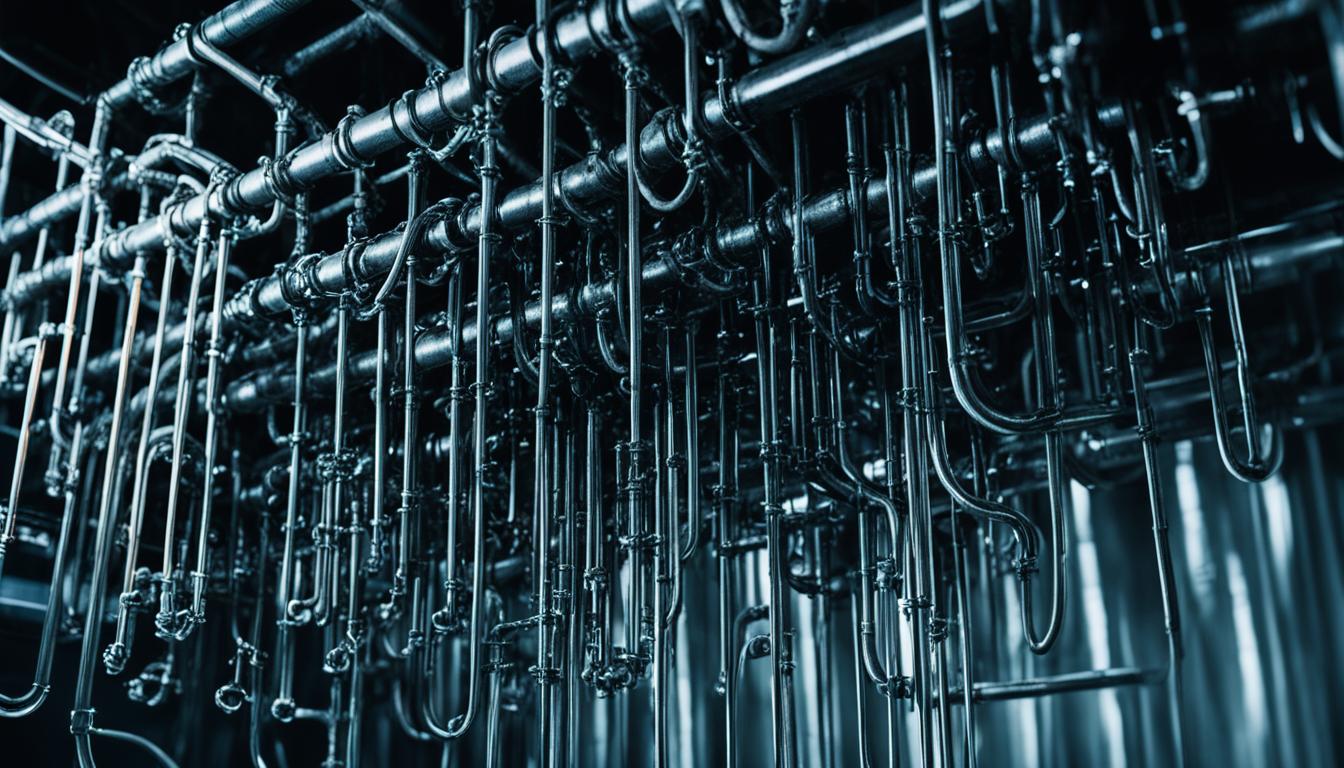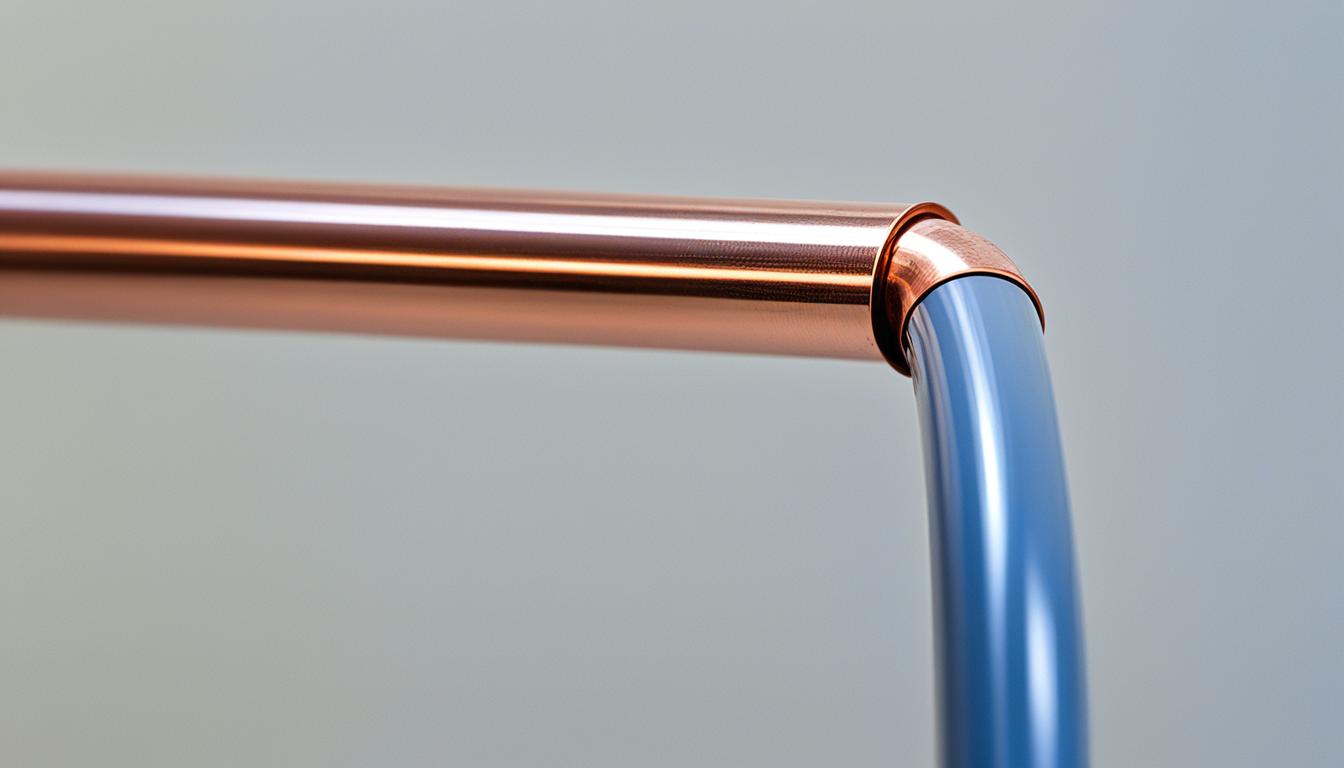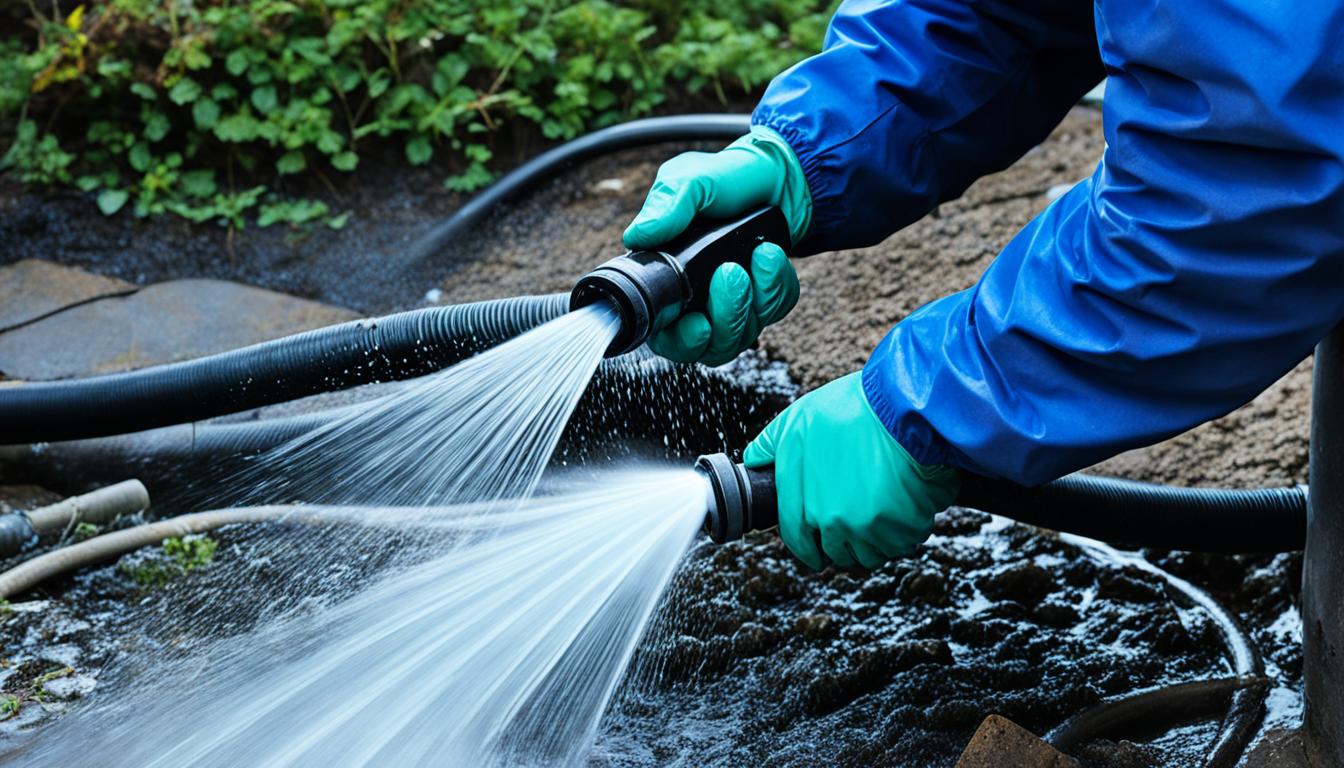Copper Pipe Lifespan: How Long Does It Last?
Did you know that copper pipes are one of the top materials used for water supply lines in residential and commercial buildings? They have been relied upon for decades due to their durability and reliability. But have you ever wondered just how long copper pipes can last?
Copper pipes have varying lifespans depending on their type and thickness. The three main types of copper pipes are M-type, L-type, and K-type. M-type copper pipes, with the thinnest walls, have a lifespan ranging from 20 to 50 years. On the other hand, L-type copper pipes, which are thicker and more commonly used in residential buildings, can last up to 50 years. And if you’re looking for the most durable option, K-type copper pipes, primarily used in industrial settings, can exceed 50 years with proper care.
However, don’t be fooled by their longevity. Even copper pipes can fail within 5 to 10 years if not properly maintained. Factors such as water chemistry, water pressure, and maintenance practices can affect their lifespan. That’s why regular inspections are crucial to detect any potential issues early on.
Key Takeaways:
- Copper pipes are commonly used in water supply lines due to their durability.
- The lifespan of copper pipes depends on the type and thickness.
- M-type copper pipes last 20 to 50 years, while L-type copper pipes can reach 50 years.
- K-type copper pipes, used in industrial settings, can surpass 50 years.
- Regular inspections are important for maintaining copper pipes.
Types of Copper Pipes and Their Lifespan
When it comes to copper pipes, there are three main types to choose from: M-type, L-type, and K-type. Each type has its own unique characteristics and lifespan, making it essential to understand the differences before making a decision.
- M-type copper pipes: These pipes have the thinnest walls among the three types and are known for being cost-effective and easy to work with. However, their lifespan is relatively shorter, ranging from 20-50 years. It’s important to note that M-type copper pipes may not meet building codes in certain areas.
- L-type copper pipes: Offering a thicker wall compared to M-type pipes, L-type copper pipes are more durable and have a longer lifespan. They can last up to 50 years and are often recommended for residential buildings. L-type pipes are known to withstand environmental factors better than M-type pipes.
- K-type copper pipes: Primarily used in industrial settings, K-type copper pipes are designed to be the thickest and most durable option. With the right conditions, they can last over 50 years. These pipes are ideal for applications that require maximum strength and durability.
Choosing the right type of copper pipe depends on your specific needs and local building codes. It’s crucial to consider factors such as budget, intended use, and the desired lifespan of the pipes. Next, let’s explore the pros and cons of copper pipes to further inform your decision-making process.
Pros and Cons of Copper Pipes
Copper pipes offer numerous advantages and considerations, making it important to weigh the pros and cons before making a decision. Here are the key advantages and disadvantages of using copper pipes for your plumbing system:
Advantages of Copper Pipes
- Copper pipes are lightweight and flexible, making them easy to install and work with.
- They have a long history of use and are considered a reliable plumbing material.
- Copper pipes are 100% recyclable and can be sold as scrap, making them a sustainable choice.
Disadvantages of Copper Pipes
- Copper pipes can add a metallic flavor to drinking water, especially if they are old.
- Compared to other pipe materials such as PEX and PVC, copper pipes tend to be more expensive.
- Copper pipes can corrode if exposed to acidic water or high mineral content, requiring regular maintenance and proper water chemistry.
Overall, while copper pipes have several advantages such as being lightweight, flexible, and sustainable, they do have some potential drawbacks such as a metallic taste in water and higher costs. It’s important to consider these factors and assess them in relation to your specific needs and budget when deciding on the plumbing material for your project.
Factors Affecting the Lifespan of Copper Pipes
Several factors can influence the lifespan of copper pipes, making it essential to understand and address these factors for optimal performance and longevity. By considering these key factors and employing appropriate preventive measures, you can ensure the durability and reliability of your copper plumbing system.
1. Water Chemistry:
The quality of the water flowing through copper pipes can significantly impact their lifespan. Chloramines, commonly found in treated water, can accelerate corrosion in older pipes. Additionally, acidic water with a low pH can gradually corrode copper pipes over time. Regular water testing and treatment can help maintain a balanced pH level and prevent corrosion.
2. Contact with Other Metals:
When copper pipes come into contact with other metals in the plumbing system, galvanic corrosion may occur. This occurs due to a chemical reaction between different metals in the presence of water. To mitigate this issue, it is important to use appropriate connectors and fittings that minimize contact between copper pipes and other metals.
3. Water Pressure:
Excessive water pressure can place undue stress on copper pipes, leading to leaks or pipe failure. It is crucial to ensure that water pressure remains within the recommended range specified by plumbing codes. Utilizing pressure-regulating valves and periodically monitoring water pressure can help prevent potential damage to copper pipes.
4. Improper Electrical Connections:
Improper electrical connections near copper plumbing systems can cause electrolysis, leading to corrosion. It is important to ensure that electrical wiring and grounding are correctly installed and maintained to prevent any adverse effects on copper pipes.
Summary:
By considering factors such as water chemistry, contact with other metals, water pressure, and improper electrical connections, you can effectively prolong the lifespan of copper pipes and ensure the continued efficiency of your plumbing system. Regular maintenance, along with the appropriate preventive measures, will contribute to the long-term durability and reliable performance of your copper pipes.
Benefits of Choosing Copper Pipes
When it comes to selecting the right pipes for your plumbing system, copper pipes offer numerous benefits that make them a popular choice among homeowners. From their durability to their impact on home value, copper pipes are a reliable option for long-lasting plumbing solutions.
1. Durability and Longevity
Copper pipes are renowned for their durability, making them an excellent choice for long-term plumbing installations. When properly maintained, copper pipes can last for several decades, with some lasting up to a hundred years. Their ability to withstand high water pressure and resist corrosion ensures that your plumbing system remains robust and dependable over time.
2. Increased Home Value
Copper pipes are not only durable but also add value to your home. Many homebuyers recognize the benefits of copper pipes and consider them a valuable asset. The presence of copper pipes in a property can increase its resale value, making it an attractive investment for potential buyers. By opting for copper pipes, you not only ensure a reliable plumbing system but also enhance your home’s market appeal.
3. Reliability and Reputation
Copper pipes have been used in plumbing systems for years and have built a solid reputation for their reliability. They are widely recognized for their quality and performance, making them a trusted choice for homeowners and plumbers alike. Copper pipes have proven their effectiveness in residential and commercial buildings, providing peace of mind and confidence in their performance.
4. Corrosion Resistance
Another significant advantage of copper pipes is their resistance to corrosion. Unlike some other materials, copper does not rust or deteriorate easily when exposed to water or other elements. This corrosion resistance ensures that your pipes maintain their structural integrity, preventing leaks and minimizing the need for repairs. With copper pipes, you can have confidence in the longevity and efficiency of your plumbing system.
Overall, the benefits of choosing copper pipes are clear. Their durability, impact on home value, reliability, and corrosion resistance make them a smart investment for any plumbing project. Whether you are renovating your existing home or building a new one, consider the long-term advantages that copper pipes offer for a reliable and high-performing plumbing system.
| Benefits of Copper Pipes |
|---|
| Durability and Longevity |
| Increased Home Value |
| Reliability and Reputation |
| Corrosion Resistance |
Hiring a Professional Plumber for Copper Pipe Installation
When it comes to installing copper pipes, it is highly recommended to hire a professional plumber. Professional plumber for copper pipe installation possess the necessary expertise and skills to ensure a smooth and successful installation process. They have a deep understanding of copper pipe systems and are equipped with specialized tools, such as soldering torches, that are essential for proper installation.
The benefits of hiring a professional plumber for copper pipe installation are substantial. Not only do they have the knowledge of how to accurately measure and cut copper pipes, but they are also experienced in securely joining them together. Professional plumbers ensure that each connection is properly sealed, preventing potential leaks and water damage in the future. They are well-versed in local plumbing codes and regulations, guaranteeing that the installation meets all necessary requirements.
One of the main advantages of professional installation is the assurance of a reliable and durable plumbing system. Copper pipes can last for decades, but only when installed by professionals who adhere to best practices. By hiring a professional plumber, you can have peace of mind knowing that your copper pipe system will be installed correctly, minimizing the risk of future repairs and costly maintenance.
While some homeowners may be tempted to attempt a DIY installation to save on costs, the potential risks and complications can outweigh any short-term savings. Improperly installed copper pipes can lead to leaks, water pressure issues, and even structural damage. These problems can significantly increase the overall cost of the installation, as well as the inconvenience and stress involved in resolving them.
When considering the cost of copper pipe installation, it is essential to factor in the long-term benefits of professional installation. While hiring a professional plumber may seem like an additional expense upfront, it is a worthwhile investment in the durability and reliability of your plumbing system. It can prevent costly repairs and replacements down the line, ultimately saving you money in the long run.
If you’re in need of copper pipe installation, I highly recommend reaching out to a reputable and experienced professional plumber. Their expertise and commitment to quality workmanship will ensure that your copper pipe system is installed correctly and will provide you with years of reliable service.
Pros of Hiring a Professional Plumber for Copper Pipe Installation
| Advantages |
|---|
| Expertise and specialized skills |
| Knowledge of local plumbing codes |
| Secure and leak-free connections |
| Durable and reliable plumbing system |
| Potential cost savings in the long run |
Conclusion on Copper Pipe Lifespan
After examining the various factors and types of copper pipes, the conclusion can be drawn that copper pipes have a lifespan ranging from 20 to 70 years. The longevity of copper pipes depends on several key factors, including the type of pipe, maintenance practices, water chemistry, and environmental conditions.
M-type copper pipes, with their thin walls, have the shortest lifespan of 20-50 years. On the other hand, L-type and K-type copper pipes, with their thicker walls, can last up to 50 years or even longer. It’s crucial to consider the specific needs of your plumbing system and comply with local building codes when choosing the right type of copper pipe.
To ensure the prolonged lifespan of copper pipes, regular maintenance and proper water chemistry are of utmost importance. Regular inspections and proactive measures can help prevent potential failures. It is also worth noting that hiring a professional plumber for the installation of copper pipes is highly recommended. Their expertise and adherence to plumbing codes can contribute to a proper and long-lasting copper pipe system.
In conclusion, copper pipes are a popular choice for plumbing systems due to their durability and reliability. By understanding the lifespan of copper pipes and implementing appropriate maintenance practices, you can enjoy the benefits of copper pipes for decades to come.
Source Links
- https://whyrepipe.com/blog/copper-pipe-life-expectancy/
- https://todayshomeowner.com/plumbing/guides/how-long-does-copper-pipe-last/
- https://www.balkanplumbing.com/how-long-do-copper-water-lines-last/
- Investing Wisely: How Windows & Doors in Boost Property Value and Financial Health - April 24, 2025
- The Financial Impact of Personal Injuries: Why Legal Help Matters for Business Owners - April 16, 2025
- The Hidden Financial Costs of Domestic Assault: What Business Owners Need to Know - April 16, 2025
